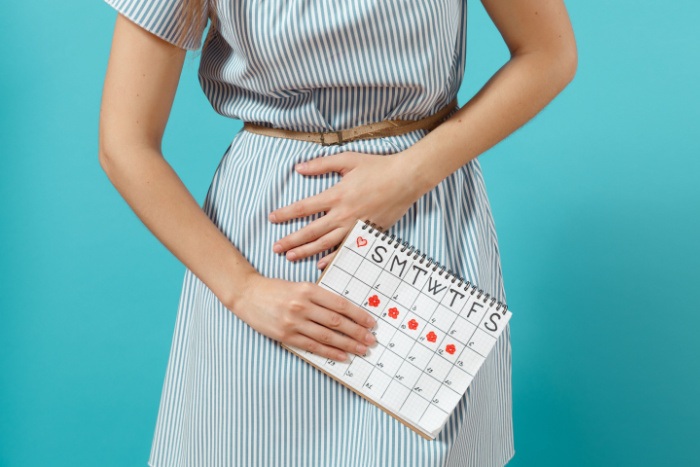Can I Do Intermittent Fasting During Periods?
Written by Andrew Brewer. ⚕️Reviewed and fact checked by our medical team.
Intermittent fasting is a long-term approach to weight loss for both men and women. Once you start using an intermittent fasting plan, you do not have to stop when you are on your period.
Because intermittent fasting affects hormone levels, it can change your menstruation cycle. Some women report missing periods during intermittent fasting; others say intermittent fasting resulted in fewer premenstrual symptoms (PMS).
While you should avoid prolonged fasts during parts of your menstruation cycle, daily time-restricted intermittent fasting shouldn’t harm your body and may even alleviate your PMS.
Key Takeaways
- Intermittent fasting can affect menstruation and hormone levels in women. While it can normalize hormones and alleviate PMS symptoms, it may also throw off the menstrual cycle or lead to a missed period if not done properly.
- Women should be cautious when doing intermittent fasting and should avoid prolonged fasting during their menstrual cycle. They should also prioritize a healthy diet, hydration, and rest to support their overall health.
- Fasting apps can be a helpful tool for women who are doing intermittent fasting, as they can help track progress, adjust fasting plans during periods, and monitor mood and diet. However, it’s important to listen to your body and not overdo it, especially during periods when you may be more vulnerable to stress and discomfort.
Intermittent Fasting Can Affect Menstruation
Intermittent fasting normalizes hormones in your body. Your endocrine system can get confused when your body is getting non-stop doses of sugars and carbohydrates.
Taking a break from digesting through intermittent fasting can help normalize your hormones, including the complex group of hormones that affect menstruation.
It’s not abnormal to have intermittent fasting throw your cycle off kilter or even miss a period. However, if you stop menstruating, it can also signify that you aren’t getting enough nutrients in your diet.
If you are sexually active and intermittent fasting, you should use a pregnancy test regularly. Intermittent fasting isn’t recommended for women who are pregnant or nursing.
The Week Before Your Period
The week before your period is when you are most vulnerable to stress, but that doesn’t mean you have to stop your intermittent fasting app.
The week before your period starts is when you experience changes to your progesterone and estrogen levels, and this can weaken your immune system. PMS can also cause inflammation (experienced as cramps and bloating), which stresses your immune system.
If you struggle to maintain your fast during your period because you’re irritable and uncomfortable, try cutting back. If you are on a time-restricted fasting plan, such as the 16:8 method, try reducing your fasting window to 12 or 14 hours to see if that helps.
The Best Fasting Methods for Women
There needs to be more research on intermittent fasting, but some studies suggest that intermittent fasting isn’t as beneficial for women as it is for men.
That doesn’t mean you won’t lose weight, but you might not experience the same benefits to your insulin resistance and glucose levels as men do.
Even calorie-cutting diets can affect women’s menstruation cycles. Women need to maintain a healthy diet, stay hydrated, and get plenty of rest, especially during the week that they are most vulnerable, right before their period starts.
Intermittent Fasting During Menopause
For women who are either in menopause or premenopausal, intermittent fasting can help alleviate some of the challenges that they face.
During perimenopause, women’s hormones fluctuate, causing them to gain weight and have problems sleeping. During this time, a lot is going on with hormone balances as estrogen levels decrease and menstruation cycles stop.
Intermittent fasting can help counteract the insulin resistance naturally occurring during menopause by stabilizing your glucose levels and increasing your insulin sensitivity.
Intermittent fasting during menopause can help solve many of women’s problems while their hormones are balancing. Combined with a healthy diet and an active lifestyle, intermittent fasting can benefit perimenopausal and menopausal women.
Track Your Fasting With an App
Using an app for fasting can improve your chances of success with intermittent fasting. Fasting apps are flexible enough to let you adjust your fasting plan during your period, and you can use the app to track your moods and diet.
Intermittent fasting is meant to help you lose weight, not make you miserable. If fasting during your period affects you negatively, don’t stress yourself out even more by trying to overdo it.
FAQ
-
Is it safe to do intermittent fasting during periods?
It is generally safe to do intermittent fasting during periods, but it depends on the individual. If you have a history of irregular periods or have concerns about your menstrual health, it is best to consult a healthcare professional before starting.
-
Will intermittent fasting affect my menstrual cycle?
Intermittent fasting may affect your menstrual cycle if you are not consuming enough calories to support your body’s needs. However, if you maintain a balanced diet and ensure you consume enough calories during your eating window, it is unlikely to impact your menstrual cycle.
-
Can intermittent fasting help with menstrual symptoms?
Some evidence suggests that intermittent fasting may help with menstrual symptoms such as bloating and cramps. However, more research is needed to confirm these findings.
-
Should I adjust my fasting schedule during my period?
Adjust your fasting schedule during your period to accommodate any changes in appetite or energy levels. For example, you should shorten your fasting window or increase your calorie intake.
-
What are some tips for doing intermittent fasting during periods?
Some tips for intermittent fasting during periods include staying hydrated, consuming enough calories to support your body’s needs, and listening to your body’s cues for hunger and satiety. It is also important to prioritize rest and self-care during this time.
